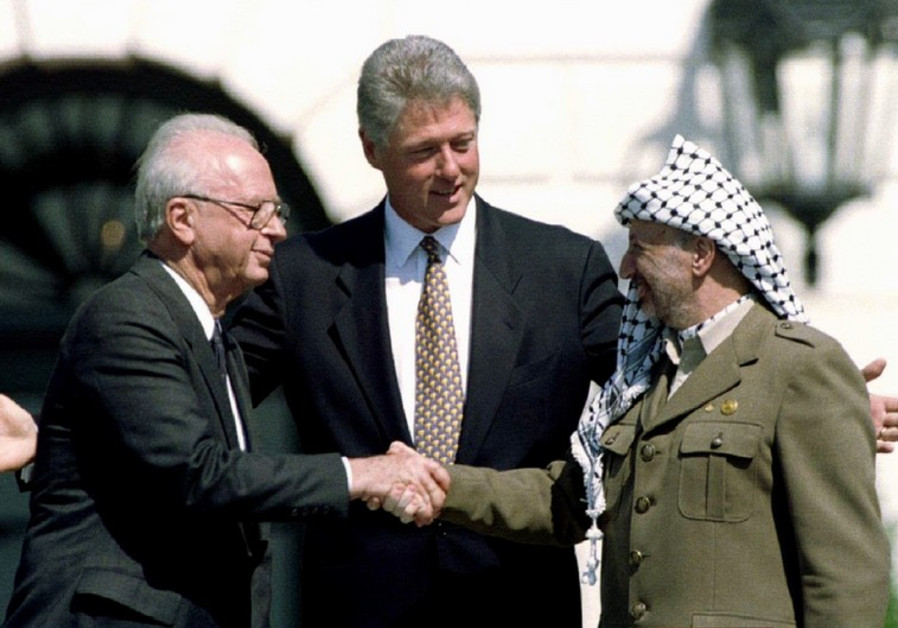Majority of Palestinians oppose Trump’s peace plan, Oslo Accords

Slain Israeli Prime Minister Rabin with former US President Bill Clinton and former PLO President Yasser Arafat after signing the Oslo Accords at the White House on September 13, 1993. . (photo credit: REUTERS)
More than 60% of the Palestinians support the Palestinian Authority’s position not to accept the US as a sole mediator in the peace process, according to a Palestinian public poll published last Tuesday.
The poll, conducted by the Jerusalem Media and Communication Center, showed that over 80% of Palestinians don’t believe that US President Donald Trump’s yet-to-be-announced plan for peace in the Middle East, which is also known as the “Deal of the Century,” would produce anything acceptable to the Palestinians. It also found that the percentage of Palestinians opposed to the Oslo Accords was on the rise.
The survey, which was conducted between June 26 and July 7, covered 1200 Palestinians from the West Bank and Gaza Strip and has a margin of error of 3%.
The poll’s results showed that Palestinians were divided over the idea of returning to peace negotiations with Israel – 49.1% were in favor of renewed negotiations and 45.6% opposed it.
The PA leadership’s position regarding Trump’s “Deal of the Century” has led to some improvement in its standing, the poll showed. The percentage of those who trust PA President Mahmoud Abbas rose to 11.1% in this poll after it was 10.6% in a previous poll published last January. Furthermore, there was a rise in the percentage of those who trust Abbas’s ruling Fatah faction more than other groups – from 22.3% to 25% over the same period.
Kushner says U.S. peace plan coming soon after Middle East visit, June 24, 2018 (Reuters)
The survey found that if presidential elections were held in which only Abbas and Hamas leader Ismail Haniyeh ran, 35.3% said they would vote for Abbas, while 19.3% said they would vote for Haniyeh.
If elections were held without Abbas, 11.7% said they would vote for jailed Fatah operative Marwan Barghouti, followed by Ismail Haniyeh, at 11.6%. Abbas’s arch-rival in Fatah, Mohammed Dahlan, came in third with 8.3%.
(function(w,d,s,i){w.ldAdInit=w.ldAdInit||[];w.ldAdInit.push({slot:10834723912266086,size:[0, 0],id:”ld-9628-9059″});if(!d.getElementById(i)){var j=d.createElement(s),p=d.getElementsByTagName(s)[0];j.async=true;j.src=”//cdn2.lockerdomecdn.com/_js/ajs.js”;j.id=i;p.parentNode.insertBefore(j,p);}})(window,document,”script”,”ld-ajs”);
Asked about the Oslo Accords that were signed 25 years ago between Israel and the PLO, more than 45% of respondents said the agreements had harmed Palestinian national interests, as opposed to 33.6% in March 2013. Only 11.9% claimed they had served Palestinian national interests, and 34.0% said the accords had made no difference.
More than 61% of respondents said they opposed the Oslo Accords (48.3% in March, 2013) compared to 24% who said they supported them.
With regards to the ongoing dispute between Hamas and Fatah, more than 37% of respondents held the Ramallah-based PA government responsible for the crisis, as opposed to 29% who blamed Hamas.
The majority of respondents, 56.9% expressed their pessimism towards the likelihood that the reconciliation agreement signed in October 2017 would be implemented as opposed to 35.5% who said the opposite.
The poll showed that the majority of respondents, 39.3% depend on social media as a source of news, followed by 28% who depend on television, 17.3% who depend on news websites, 7.4% on radio and 1.4% on newspapers.






Comments are closed.